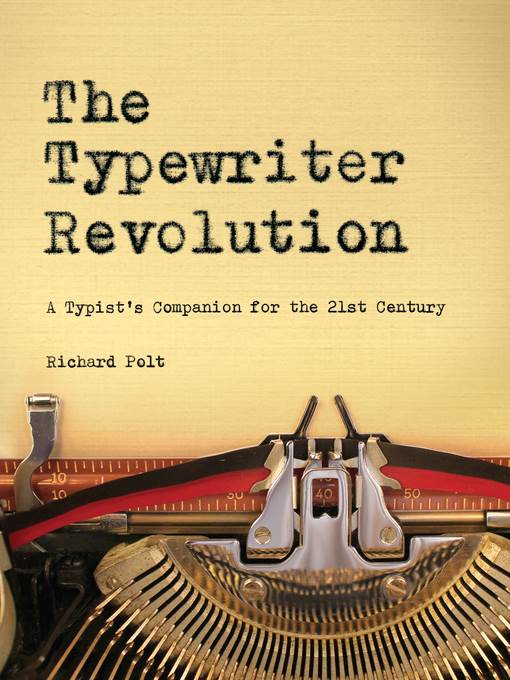
The Typewriter Revolution
A Typist's Companion for the 21st Century
فرمت کتاب
ebook
تاریخ انتشار
2015
نویسنده
Richard Poltنویسنده
Richard Poltناشر
Countryman Pressناشر
Countryman Pressشابک
9781581575873
- اطلاعات
- نقد و بررسی
- دیدگاه کاربران
نقد و بررسی

August 24, 2015
Typewriters were first developed as tools for speed and standardization, and were treated as archaic after the advent of computers, explains Polt, a typewriter repairman and founder of the Classic Typewriter Page website. Polt aims to change the typewriter’s out-of-date reputation with his book celebrating the overlooked perks of using one. He explains how to find and fix a machine, includes testimonies from writers on the freeing power of tapping out a story on a typewriter, and describes the innovative ways that people are using the typewriter today. Polt can’t quite balance his anticomputer, mock-radical rhetoric (beginning with a manifesto that starts off “We assert our right to resist the Paradigm, to rebel against the Information Regime, to escape the Data Stream”) with his insistence that the typewriter revolution is not antidigital, though he devotes much of the end of the book to a thoughtful look at the combining of typewriters and computer technology. But considering the book as a love letter instead of a call to arms makes it quite enjoyable for anyone who likes the clack of keys and the ring of the carriage return. Color photos.

Starred review from October 1, 2015
Polt (philosophy, Xavier Univ.; Emergency of Being), a blogger at the Classic Typewriter Page combines the history of typewriters (like the "Ball" used by Friedrich Nietzsche and machines that interact with computers) with a fun analysis of social implications. He examines meanings of "efficiency" over time by suggesting that often efficiency is a directive that must be rethought or perhaps rejected depending on what type of work is being completed. To accomplish these goals, Polt features scans of typed paper and plenty of illustrations of typewriters through its history. He states that most will last longer than the devices created to replace them, while acknowledging the challenges of finding replacement ribbons and repair shops (to match a trend toward interest in these machines). VERDICT Effectively blending analysis of the mantras of our age with offers of a few alternative ideas, Polt's account will attract those curious about the changes in technology and social patterns, since this book is really a culture-critique masquerading as a history.--Jesse A. Lambertson, Metamedia Management, LLC, Washington, DC
Copyright 2015 Library Journal, LLC Used with permission.

November 15, 2015
As much as we rush to acquire the next big thing, we also hate to give anything up. Our avidity for each iPhone iteration coexists with passions for fountain pens and candles. We download music and swoon over vinyl. So it's no surprise that we still thrill to the look, feel, sound, and autonomy of typewriters. A typewriter returns us to the physical reality of writing as inked keys smack into paper. There are no distractions; there is complete privacy. Typewriter collector and advocate Polt doesn't suggest giving up our digital devices but, rather, considering an alternative that allows us time and space to think and feel. Beginning with The Typewriter Manifesto, Polt makes his case in a lively, lavishly illustrated history of this newly revered machine backed by a comprehensive user's guide. In entertaining dispatches from the typosphere, Polt profiles typewriter enthusiasts, from poets to steampunkers, who gleefully escape the data stream by holding type-ins and performing street typing. A clever, illuminating, and irresistible book of typewriter appreciation and a call for digital detox and slow communication. (Reprinted with permission of Booklist, copyright 2015, American Library Association.)




دیدگاه کاربران